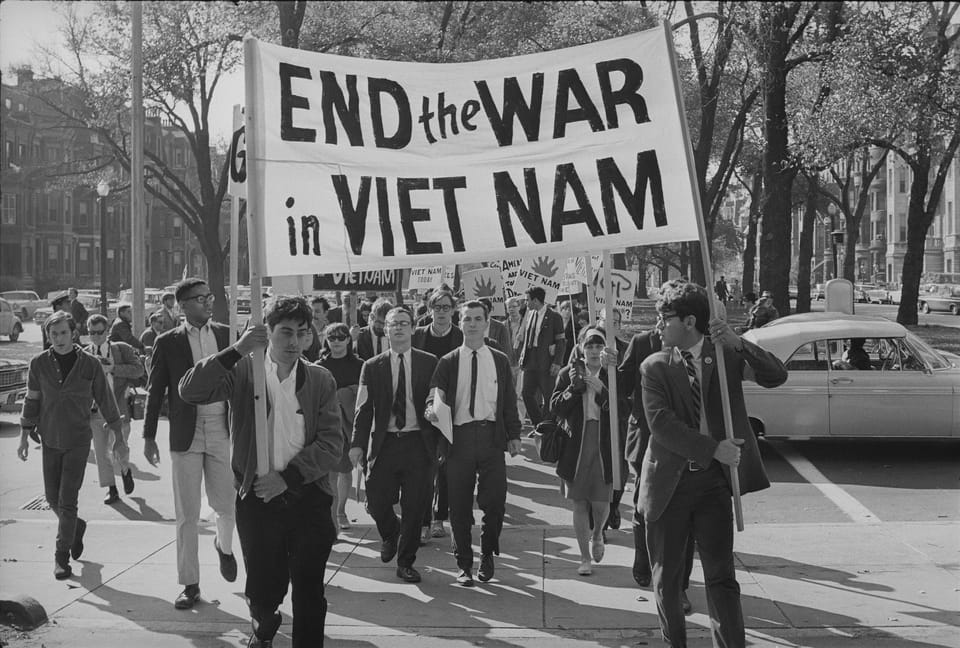New Journalism: Shifts in Perspective on The Vietnam War across different Social Classes

War, throughout history, has claimed lives and caused monumental destruction wherever it has spread – never in return a mere portion of what it has taken. The Vietnam War was no exception. From 1966 to 1970, Mailer’s “Armies of the Night” and Thompson’s “The Kentucky Derby Is Decadent And Depraved” illustrate a shift in perspective on the Vietnam war across different social classes. In “Armies of the Night”, war was seen as the biggest threat, however, in Thompson’s work, the Kentucky Derby took precedence.
As the Vietnam War raged on, the growing number of casualties and the perceived lack of moral justification for the conflict prompted a profound shift in American perspectives. The increasing death tolls with mounting evidence of unjustifiable actions, such as the My Lai Massacre, stirred widespread public outcry and raised fundamental questions about the purpose and legitimacy of the war effort, and so, a great amount of questions were raised by the people – one of them includes “what are we actually fighting for?”. With no victory to be made, civilians from a broad spectrum of American society united with the same middleground – the war needed to stop.
Draft resisters' protest, led by William Sloane Coffin, Jr, Chaplain at Yale, represented a pivotal moment in American history, where ordinary citizens dared to challenge entrenched power structures and demand accountability(Mailer, 1968). Although Mailer had doubts on the draft resisters’ approach in a way that he thought it would be more beneficial for those drafters to go into the army so that their voice would have some ‘currency’, he himself didn’t know “if he would burn or surrender his own draft card if he were young enough to own one”. The symbolism of this march, culminating in a mass gathering, underscored the unity and determination of the anti-war movement.
“War is Peace, Slavery is Freedom, Ignorance is Strength.” — George Orwell
In ‘The Kentucky Derby is Decadent and Depraved’, however, Thompson shed light on the juxtaposition between the indisputable reality of the derby and the harsh realities of war. Despite the turmoil and conflict happening elsewhere, life in Kentucky, particularly around the Derby, seems untouched and disconnected.
According to Statista’s findings by McEvoy(2022), protests gradually rose and reached its peak in 1970, coinciding with the year of “The Kentucky Derby is Decadent and Depraved”. This trend highlights a widespread neglect and the disregard to acknowledge global events, with attention focused on the prestigious horse race despite 1970 being the year with highest numbers of protests.
Examining George Orwell’s phrase provides a lens through which we can better visualise that ignorance is not just incidental but rather intentionally cultivated and accepted by the people at the derby. Similarly, the title "The Kentucky Derby is Decadent and Depraved" alludes to a contrast between the surface glamour of the event and the underlying moral decay or indifference to social issues. “Total chaos, no way to see the race, not even the track...nobody cares. Big lines at the outdoor betting windows, then stand back to watch winning numbers flash on the big board, like a giant bingo game.”(Thompson, 1970). Just as in Orwell's concept where war is presented as a form of peace, the Derby becomes a symbol of escapism where revellers prioritise indulgence and entertainment over broader societal concerns.
“Yale? Did you see today's paper? New Haven is under siege. Yale is swarming with Black Panthers...I tell you, Colonel, the world has gone mad, stone mad.”(Thompson, 1970). In this part, Thompson's mention of New Haven being "under siege" and Yale being "swarming with Black Panthers" points to the intense activism and civil unrest happening beyond the confines of the Derby. Their presence at Yale University symbolises the broader struggles for racial justice and social change occurring across America during the Civil Rights era. However, despite so much going on, the attendees of the Derby or “Jimbo”, seemed as if they were disconnected from reality. This perspective of societal detachment, compared with ‘Armies of the Night’, is the stark opposite. While Thompson’s ‘The Kentucky Derby is Decadent and Depraved’ focuses on the complacency and ignorance among the visitors, Mailer’s book chronicles intense advocacy and civic engagement from the people.
In summary, both ‘Armies of the Night' and ‘The Kentucky Derby is Decadent and Depraved’ offer compelling insights into the societal response to the Vietnam War, highlighting a profound shift in perspective in social classes. Mailer vividly portrays dissent among diverse groups – college students, draft resisters, and civilians, who collectively opposed the war. Contradictory, ‘The Kentucky Derby is Decadent and Depraved’ highlighted the contrast between the undeniable glamour of the Derby and the truths of war. While there were large amounts of protests elsewhere, Kentucky, especially during the Derby, were isolated from these harsh realities that others are experiencing. Regardless of the differences, both texts greatly emphasise on how people’s perspective and actions played an important role in shaping the public’s understanding of the war and its impact on the society.
References
Mailer, N. (1968). Armies of the Night: History as a Novel / The Novel as History. New American Library.
McEvoy, O. (2022). Annual number of protests in the United States against U.S. military involvement in Vietnam from 1963 until 1975. Statista. https://www.statista.com/statistics/1333974/annual-us-protests-against-vietnam-war/# statisticContainer
Orwell, G. (1949). 1984. Secker & Warburg.
Thompson, H. (1970). The Kentucky Derby is Decadent and Depraved. Scanlan’s Monthly.
Member discussion